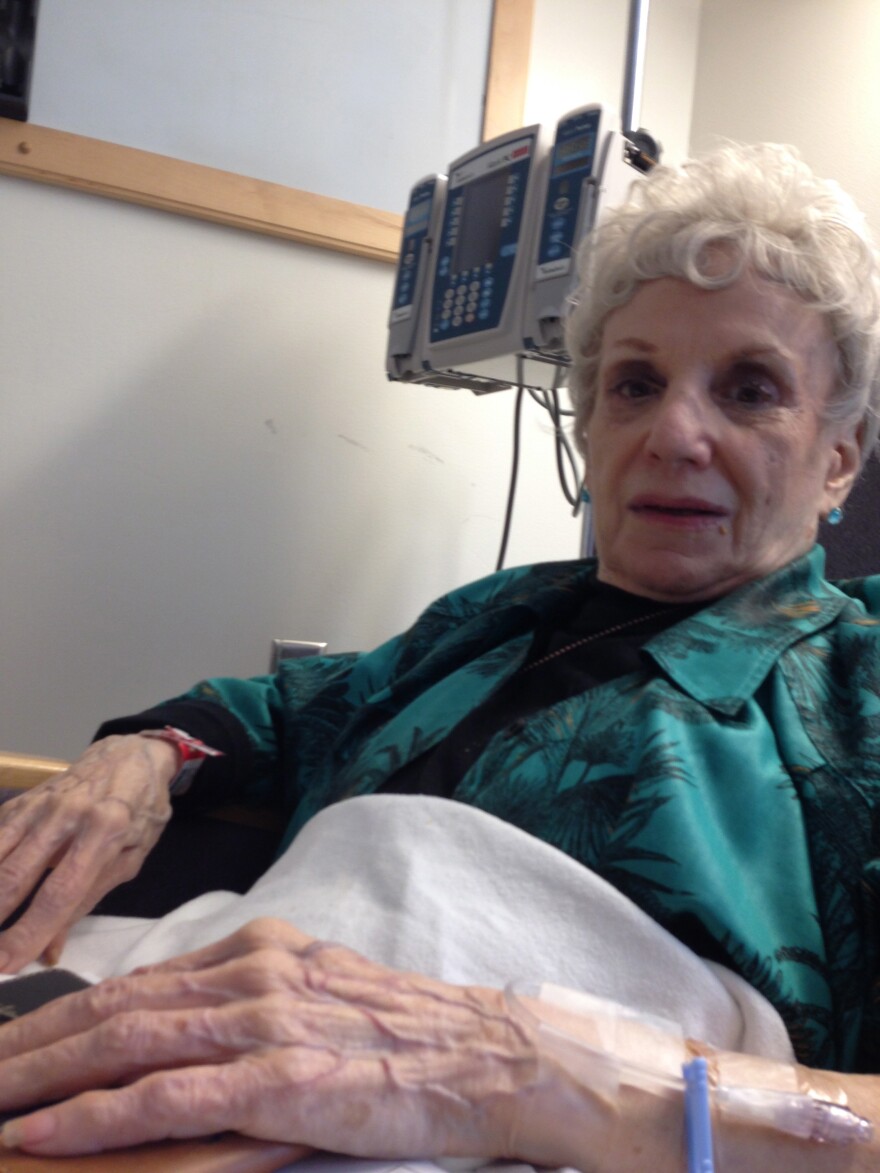Imagine shopping around for a new home, but instead of looking for a new place to live, you are looking for a place to die. That’s the situation 83-year-old Norma Chaty found herself in. It’s hard enough to lay the groundwork for one’s own death. It’s even harder for people like Norma, who are alone and have little money. This is a story of one woman’s choice between quality and quantity of life, and what she discovered about the business of dying.
Every other day, a driver picked up Norma Chaty and took her to Portland Adventist Medical Center.
Norma Chaty: “You go, you have your blood drawn and sent to the lab. Then, depending on the count, you need an infusion or you don’t.”
A blood transfusion. About once a week. Without it, she would die in days.
Norma Chaty: “Then the poker – the professional poker…she just roams each floor, finding veins. And then time wise each unit… is 3 hours….So Ride Connection picks me up at 8:00 I’m there at 8:30 and get home in time for Rachel Maddow, which is 6:00.”
Norma Chaty:
Norma Chaty: "My existence right now is certainly not living. But I'm alive."
In late 2012, Norma was diagnosed with a blood disease that turned into terminal leukemia. The transfusions that kept her alive cost about $2500 each. Norma paid $15 bucks out of pocket. Medicare and insurance picked up the rest. A year after her diagnosis, Norma decided living this way just wasn’t worth it, so she decided to prepare for the inevitable.
Norma Chaty: “I asked my doctor when I stop infusions, what will I have 5-10 days, and she said yes.”
But what Norma didn’t expect was to find herself in the gap between medical care and end of life care. The pragmatic questions she faced became a delicate balancing act between time and money.
Norma Chaty: “Do I have enough money to go into a foster care home, etcetera? And to coordinate my death so that my body is still fresh when they come to pick me up. When I die, I want my body to be donated.”
So Norma set out to orchestrate her final blood transfusion to coincide with finding a place to die. She wanted a room of her own and hospice care. But Norma wasn’t eligible for hospice because she was still getting life-prolonging blood transfusions.
Let’s take a step back. It used to be that Medicare made it easier for people to start hospice because of two specific diagnoses: failure to thrive and debility. But new Medicare rules under the Affordable Care Act cut them out. That means more people like Norma end up living with serious illness but lacking support.
Arthur Caplan: “If you’re not willing to forego further therapeutic efforts, then you can’t go to hospice. You almost have to say, I’m done. I’m ready to die. No more treatments that may in any way extend my life.”
Arthur Caplan heads the bioethics division of New York University Langon Medical Center. He says advances in medical care come with a price.
Arthur Caplan: “Enormous costs at the end of life for very very sick people who may not even be having really much of a quality of life. Yet, the public has made it very clear, it doesn’t want to hear about death panels, it doesn’t want to hear about rationing at least when it comes to end of life care issues, so rightly or wrongly, we’re paying.”
Norma did get some help from palliative care. It’s a team approach dispatched by hospitals toward symptom management, patient goals and quality of life. Her palliative care nurse practitioner Joanna Lezak saw Norma struggle through her decisions.
Joanna Lezak: “It was very difficult to say, when am I done, when am I going to die, when am I going to stop blood transfusions when they were still working for her. They were still allowing her to be as independent as she was. For people like Norma, the tragedy is that she was left to navigate a very complex medical system on her own. I think we need to start asking ourselves these questions and maybe revamp some of the medical system so that it doesn’t create so many people like Norma."
Norma researched her options. But it turns out she fell into another gap. Her $2400 monthly income from social security and pension checks was too much to qualify her for Medicaid. That would have helped pay for adult foster care. At the same time, a long list of foster homes rejected her because she couldn’t afford the standard rate on her own.
Then one of the foster homeowners had a change of heart and let her in at a discount because, she figured, Norma wouldn’t be there long.
Norma wrote a check for all the money she had left - about $2000. The plan was coming together. She could now end the blood transfusions and go on hospice.
On moving day, two hospice workers helped Norma pack a small bag. She left her wigs behind and her bed unmade. Then Norma was lifted into a medi-van and driven to her final home. Here’s what she said she learned about the business of dying.
Norma Chaty: “Unless you’re very very poor, or very very rich. You ain’t gonna get it. You’re gonna end up in a place like this which is just a stop over – and I think that people should know that.”
Norma lived there 10 days. It wasn’t perfect, but it was comfortable, and she wasn’t alone. A few hours after she died, Norma got her final wish: her body was collected and given to medical research.


